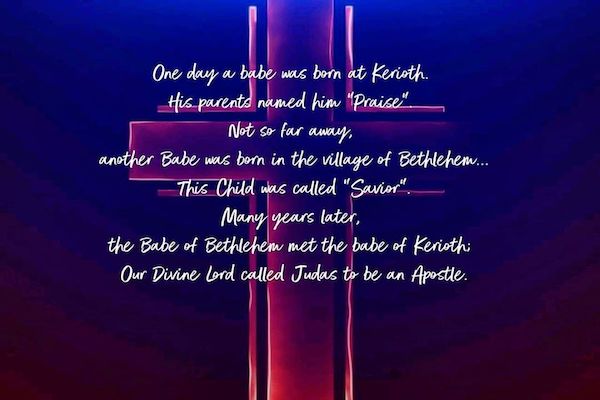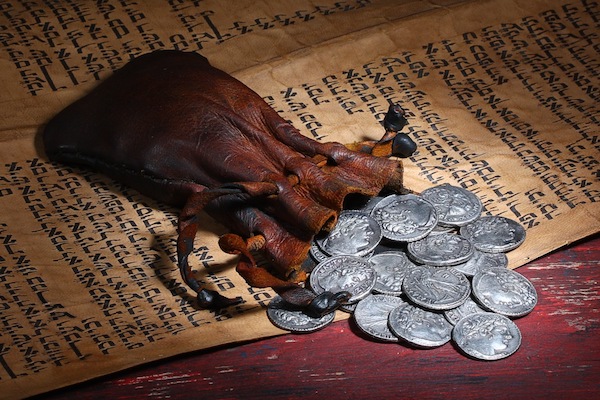LENT 2024: Day 17 - LIFE OF CHRIST

LENT 2024: DAY 17 - Monday March 4
“One day a babe was born at Kerioth. His parents, looking forward to the promise of a great manhood, named him “Praise”. Friends and relatives brought gifts in tribute to the new life that was born into the world. Not so far away, another Babe was born in the village of Bethlehem. Shepherds and Wise Men brought gifts to this Child whose name was called “Savior”. Many years later, the Babe of Bethlehem met the babe of Kerioth; Our Divine Lord called Judas to be an Apostle.
He was the only Judean in the apostolic band, all of the others being Galileans. Probably because of the talent for administration which was common among the Judeans, Judas was naturally more fitted to be the treasurer of the apostolic band than any Galilean. To use a man for what he is naturally best fitted is to keep him, if one can, from apostasy and dissatisfaction. At the same time, life’s temptations come most often from that for which one has the greatest aptitude. There must also be an inward failure before there can be an outward one. The only failure noted in Judas, as far as the records are concerned, was the sin of avarice. In him this was a kind of a root sin, for out of it, as from a dirty fountain, poured the sin, so great that it were: “Better for than man if he had never been born.” (Matthew 26:24)
A superficial reading of the life of Judas bases the beginning of the betrayal the night of the Last Supper. This is not the fact, for the first record of the betrayal of Judas is when Our Blessed Lord announced Himself as the Bread of Life. The beginning and the end of Judas’ act of betrayal were both associated with Christ as the Bread of Life. The first knowledge of the betrayal of Judas is not when Our Lord instituted the Memorial of his death at the Last Supper, but when He promised it at the beginning of His public life. Into this incident of the Divine life becoming the food of men was inserted the first record of the betrayal of Judas: “Jesus knew from the first which were those who did not believe, and which of them was to betray Him.” (John 6:65)
The hand on the dial already pointed to the hour of His death; from that moment on, Our Blessed Lord endured the presence of the one who would betray Him. The announcement of the Bread of Life was the beginning of the disenchantment of Judas; it was another kind of Kingdom Our Lord was speaking of than the one for which Judas hoped. This dissatisfaction of Judas must have increased enormously the next day, when Judas found that Our Blessed Lord refused to become a king and fled into the mountains alone.
The sixth day before the Crucifixion a great supper was made at Bethany at which Martha served, and Lazarus was one of them that were at table with him Mary, realizing the future better than any other guest and how near He was to His death, anointed Him in preparation for the burial. When Judas saw the ointment being poured forth, he immediately set a price upon it. This was the week of price-setting, for in a few days he would value the life of Our Lord at thirty pieces of silver. And now the ointment he valued at about two hundred days’ wages, for in those days the average wage of a man was a penny a day. As John describes it: “One of His disciples, the same Judas Iscariot who was to betray Him, said when he saw it, ‘Why should not this ointment have been sold? It would have fetched two hundred pieces of silver, and alms might have been given to the poor.” (John 12:4-5)
Judas was too materialistic to be concerned with the beauty of the deed. He failed to see that some offerings are so sacred that a price cannot be put upon them… Judas knew only that his betrayal of the Master was near; Mary knew that the death of the Master was near. Putting on the mask of charity, Judas simulated anger that such precious perfume should be wasted, but John gave the reason for his statement: “He said this, not from any concern for the poor, but because he was a thief; he kept the common purse and took what was put into it.” (John 12:6)
While Mary, in her devotion, was unconsciously providing for the honor of the dead, Judas, in his selfishness, was consciously bring about death itself. What a contrast between the money box of Judas and the alabaster box of Mary; between the thirty pieces of silver, and the two hundred silver pieces; between true liberality and hypocritical interest in the poor.
When Our Blessed Lord again spoke openly of His death, saying that Mary was anointing Him for a sacrifice, Judas knew that, if he was to realize anything out of his association with Christ it must be done quickly. In a cataclysm, something must be salvaged. “And at that, one of the twelve Judas who was called Iscariot, went to the chief priests and asked them, ‘What will you pay me for handing Him over to you?’ Whereupon they laid down thirty pieces of silver. And he, from that time onwards, looked about for an opportunity to betray Him.” (Matthew 26:14-16)
Symbolic it was that Our Lord was paid for out of the temple money which was destined for the purchase of sacrifices; more symbolic still was it that He Who took the form of a Servant was sold at the price of a slave.”

(Chapter 38, pgs. 613 – 619)
+ FRASES PARA LEER